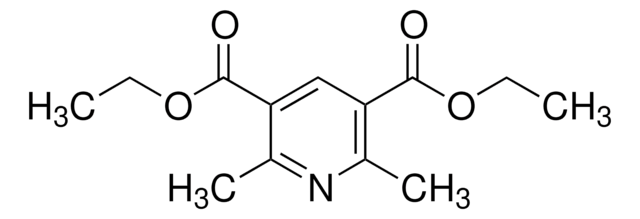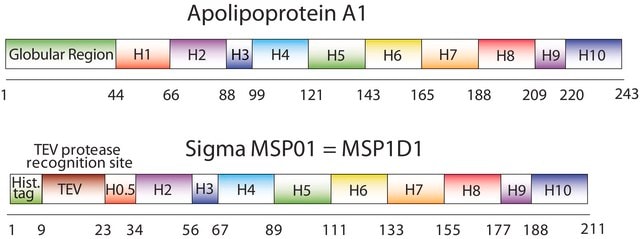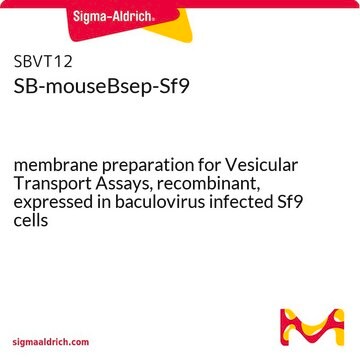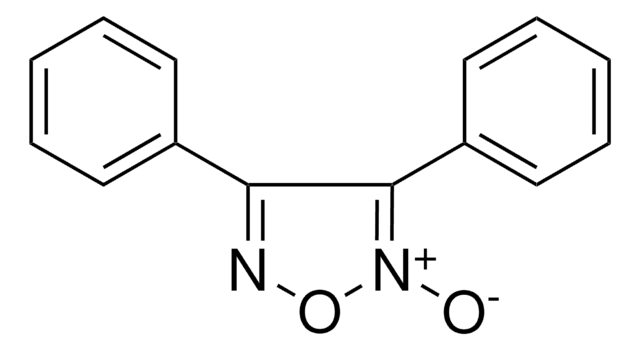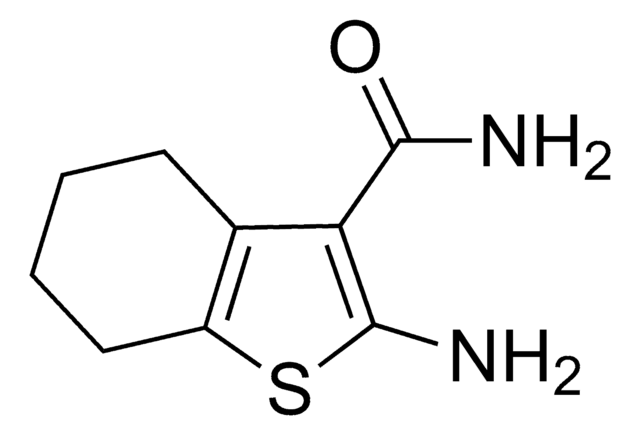SBVT02
SB-BSEP-Sf9
membrane preparation for Vesicular Transport Assays, recombinant, expressed in baculovirus infected Sf9 cells
Sinónimos:
ABCB11, BSEP, BSEP human, BSEP human membrane vesicles, Bile salt export pump
Iniciar sesiónpara Ver la Fijación de precios por contrato y de la organización
About This Item
UNSPSC Code:
12352200
Productos recomendados
recombinant
expressed in baculovirus infected Sf9 cells
form
liquid
concentration
5 mg/mL
color
off-white
UniProt accession no.
shipped in
dry ice
storage temp.
−70°C
Gene Information
human ... ABCB11(8647)
General description
Membrane Preparations for Vesicular Transport Assays (VT) are suitable for general drug-efflux transporter interaction studies. Both substrate and inhibitor interactions can be assessed using vesicles. The success of substrate interaction studies strongly depends on the passive permeability of the compound. High permeability substrates might not be detected. Control Membranes with no-, or significantly lower transporter activity are also available.
Application
In the vesicular transport assay so-called "inside-out" membrane vesicles containing ABC transporters are applied. Incubating substrates of the respective efflux transporter in the presence of the inverted membrane vesicles and ATP will allow measuring accumulation of the substrates into the vesicles. In many cases radiolabeled reporter substrates are used but recently SOLVO developed the new PREDIVEZTM Vesicular Transport Kits that use fluorescent reporter substrates.
The standard vesicular transport assay is an inhibitory assay performed with cold test articles. This assay provides information on any interaction between the ABC transporter and the test article. The transport of the reporter substrate is measured in the presence of the test article (typically in 7 concentrations) and IC50 is defined as the concentration inhibiting the transport of the reporter substrate by 50%.
Should radiolabeled form of the investigated compound or adequate analytical methods (LC/MS, HPLC) be available, the vesicular transport assay may be performed in a direct format without the reporter substrate and may identify substrate nature of the test article. The vesicular transport substrate assay is a low throughput assay. It is suitable for low permeability test compounds as high permeability compounds may escape from the vesicles through the lipid bilayer.
The standard vesicular transport assay is an inhibitory assay performed with cold test articles. This assay provides information on any interaction between the ABC transporter and the test article. The transport of the reporter substrate is measured in the presence of the test article (typically in 7 concentrations) and IC50 is defined as the concentration inhibiting the transport of the reporter substrate by 50%.
Should radiolabeled form of the investigated compound or adequate analytical methods (LC/MS, HPLC) be available, the vesicular transport assay may be performed in a direct format without the reporter substrate and may identify substrate nature of the test article. The vesicular transport substrate assay is a low throughput assay. It is suitable for low permeability test compounds as high permeability compounds may escape from the vesicles through the lipid bilayer.
Physical form
Supplied as frozen membrane vesicles, containing 5 mg/ml membrane protein, labeled with volume, catalog number (transporter) and date of production.
Legal Information
Distributed for SOLVO Biotechnology, Inc.
Related product
Referencia del producto
Descripción
Precios
Storage Class
10 - Combustible liquids
wgk_germany
WGK 1
flash_point_f
Not applicable
flash_point_c
Not applicable
Certificados de análisis (COA)
Busque Certificados de análisis (COA) introduciendo el número de lote del producto. Los números de lote se encuentran en la etiqueta del producto después de las palabras «Lot» o «Batch»
¿Ya tiene este producto?
Encuentre la documentación para los productos que ha comprado recientemente en la Biblioteca de documentos.
Emese Kis et al.
Toxicology in vitro : an international journal published in association with BIBRA, 26(8), 1294-1299 (2011-11-29)
Bile salt export pump (BSEP, ABC11) is a membrane protein that is localized in the cholesterol-rich canalicular membrane of hepatocytes. Its function is to eliminate unconjugated and conjugated bile acids/salts from hepatocyte into the bile. In humans there is no
Jasminder Sahi et al.
Chemico-biological interactions, 159(2), 156-168 (2005-12-17)
CI-1034, an endothelin-A receptor antagonist was being developed for pulmonary hypertension. Drug-drug interaction studies using human hepatic microsomes were conducted to assess CYP1A2, CYP2C9, CYP2C19, CYP3A4 and CYP2D6 inhibition potential; CYP3A4 induction potential was evaluated using primary human hepatocytes. CI-1034
Kari T Kivistö et al.
Pharmaceutical research, 24(2), 239-247 (2006-12-21)
The role of drug transporters in pravastatin disposition is underlined by the fact that pravastatin does not undergo significant cytochrome P-450 (CYP)-mediated biotransformation. The organic anion transporting polypeptide 1B1 (OATP1B1), encoded by SLCO1B1, and multidrug resistance-associated protein 2 [MRP2 (ABCC2)]
Xingguo Cheng et al.
Biochemical pharmacology, 74(11), 1665-1676 (2007-09-28)
Sodium-taurocholate cotransporting polypeptide (Ntcp) and bile salt export pump (Bsep) are two key transporters for hepatic bile acid uptake and excretion. Alterations in Ntcp and Bsep expression have been reported in pathophysiological conditions. In the present study, the effects of
Richard H Ho et al.
Pharmacogenetics and genomics, 20(1), 45-57 (2009-12-17)
Our aims were to identify and functionally characterize coding region nonsynonymous single nucleotide polymorphisms in the hepatic efflux transporter, bile salt export pump (BSEP; ABCB11), and to assess interindividual variability in BSEP expression. We identified 24 single nucleotide polymorphisms, including
Nuestro equipo de científicos tiene experiencia en todas las áreas de investigación: Ciencias de la vida, Ciencia de los materiales, Síntesis química, Cromatografía, Analítica y muchas otras.
Póngase en contacto con el Servicio técnico